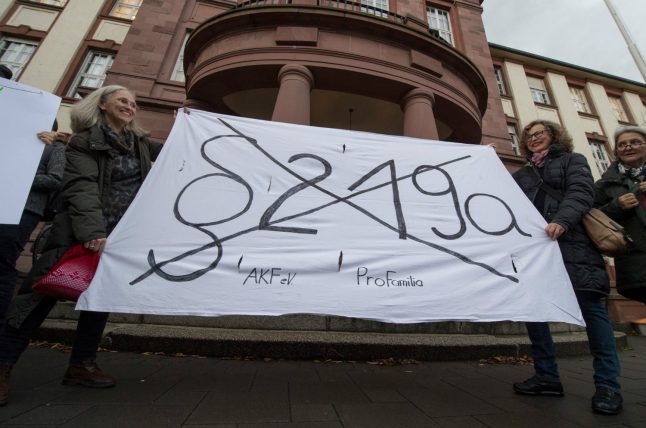But the controversial paragraph 219a will not be abolished, despite calls by politicians and pro-choice campaigners.
A total of 371 members of parliament voted in favour of the reform, 277 were against and four abstained, German media reported.
SEE ALSO: Explained: Germany's plans to change controversial abortion laws
SEE ALSO: What you need to know about the abortion law battle that divides Germany
The reforms stipulate that doctors may inform members of the public, on their websites for example, that they carry out terminations of pregnancies. If people want further information, however, they must refer to authorities, advice centres and medical associations.
In addition, the German Medical Association (Bundesärztekammer) is to keep a list of doctors who offer abortions. A study on the psychological effects of abortions is also planned, reported Zeit.
The coalition, made up of the centre-right CDU/CSU and centre-left SPD had already reached an agreement dubbed the “compromise” to relax abortion laws.
This was read by many as a defeat for the SPD, as they had previously wanted to completely scrap the paragraph, a demand backed by leftist opposition parties the Greens and The Left (Die Linke).
German law allows abortions but effectively discourages them through various hurdles, including the law in question, article 219a, which dates to May 1933, shortly after Hitler assumed full powers of Nazi Germany.
According to the Federal Statistical Office, around 101,000 pregnancies were terminated in Germany in 2017.
 Chancellor Angela Merkel and the AfD's Beatrix von Storch vote in the Bundestag on Thursday. Photo: DPA
Chancellor Angela Merkel and the AfD's Beatrix von Storch vote in the Bundestag on Thursday. Photo: DPA
Hänel's actions would still be illegal
Last year Gießen doctor Kristina Hänel was fined €6,000 for breaking the law by publishing information on abortion services on her website.
As reported in The Local, it is likely that under the reforms, Hänel's actions would still be illegal.
Pro-choice campaigners say the softening of the ban is not enough and that the clause should be completely scrapped.
SEE ALSO: Five things to know about abortion in Germany
They say that the changes to paragraph 219a still mean that women are still not trusted to make their own decisions with readily available information.
In case you‘re wondering, that means that doctors can’t inform patients online about methods used, risks involved, cost of the procedure, or what they should bring along. @haenel_kh’s website is still illegal & the reformed law could even be unconstitutional ?? #219a
— Kate Cahoon (@katecahoon) February 21, 2019
The Hänel case revived debate in Germany and among the coalition government led by Chancellor Angela Merkel's conservative Christian Democrats.
Strict conservative and Catholic Annegret Kramp-Karrenbauer, who took over as leader of the CDU in December, has spoken out in favour of keeping the law in place.
'Women's expectations massively disappointed'
Reaction to the vote has been mixed.
The Union praised the reform as a successful compromise. Deputy faction leader of the CDU/CSU, Nadine Schön, said it was a good compromise between the different positions, reported Zeit.
It is important to the CDU/CSU that the advertising ban is not scrapped, she said: “In this way we make it clear that an abortion is not a medical service like any other,” she added.
Beatrix von Storch, deputy faction leader of the far-right Alternative for Germany (AfD), described the reform in the Bundestag as “impertinence”.
With the compromise, the CDU/CSU had abandoned its own values, she said. Storch called abortions illegal and demanded that the government protect “unborn life” and added that the reform of paragraph 219a would normalize abortions.
Free Democrats MP Nicole Bauer accused the coalition of using the issue as a power play in politics, saying the SPD and Union had postponed the reform for far too long. In addition, the compromise continues to discriminate against women and criminalize doctors, she said.
“They have massively disappointed the expectations of women in this country,” said The Left politician Cornelia Möhring. Information on abortions remains limited and women would continue to be reprimanded and the mistrust of doctors would continue, she added, saying that paragraph 219a continues to equate advertising with information.



 Please whitelist us to continue reading.
Please whitelist us to continue reading.
Member comments